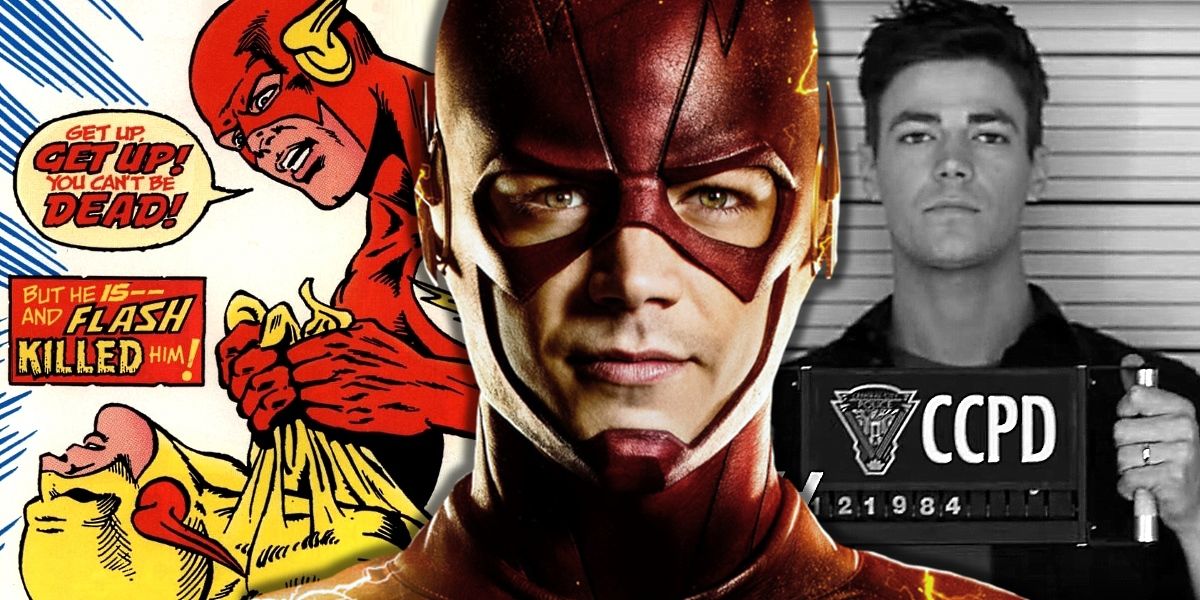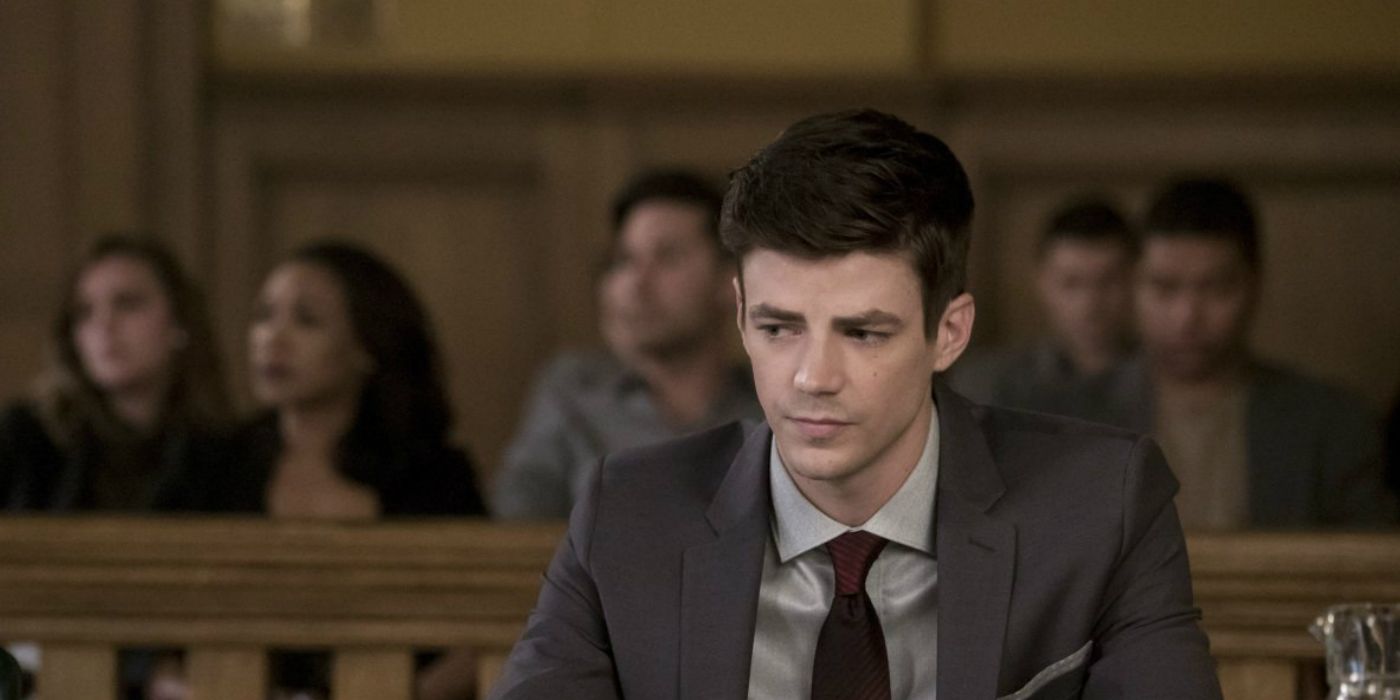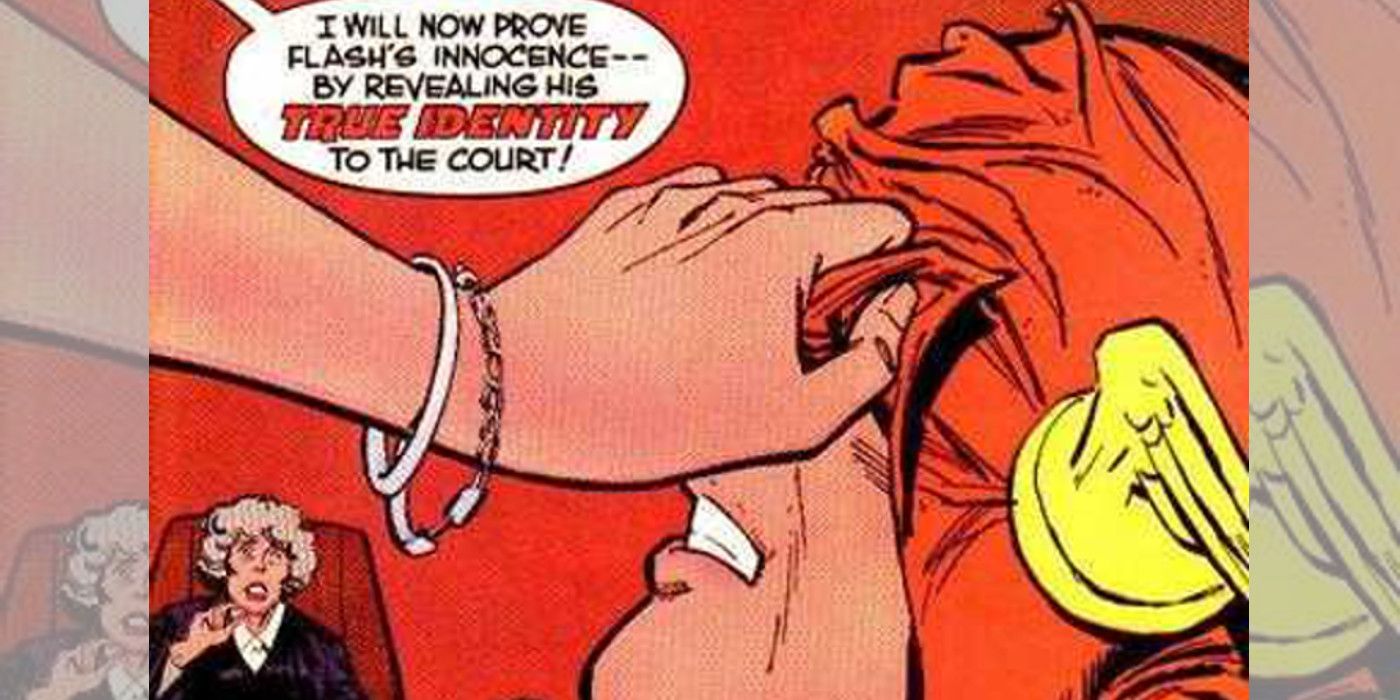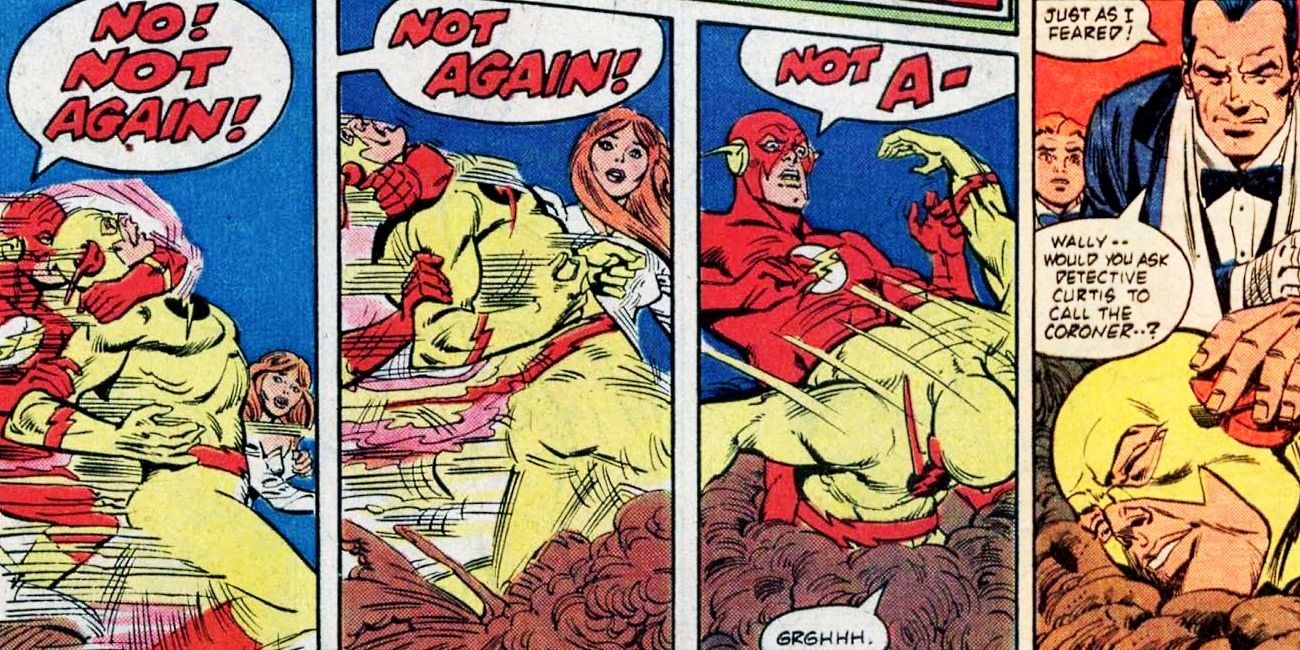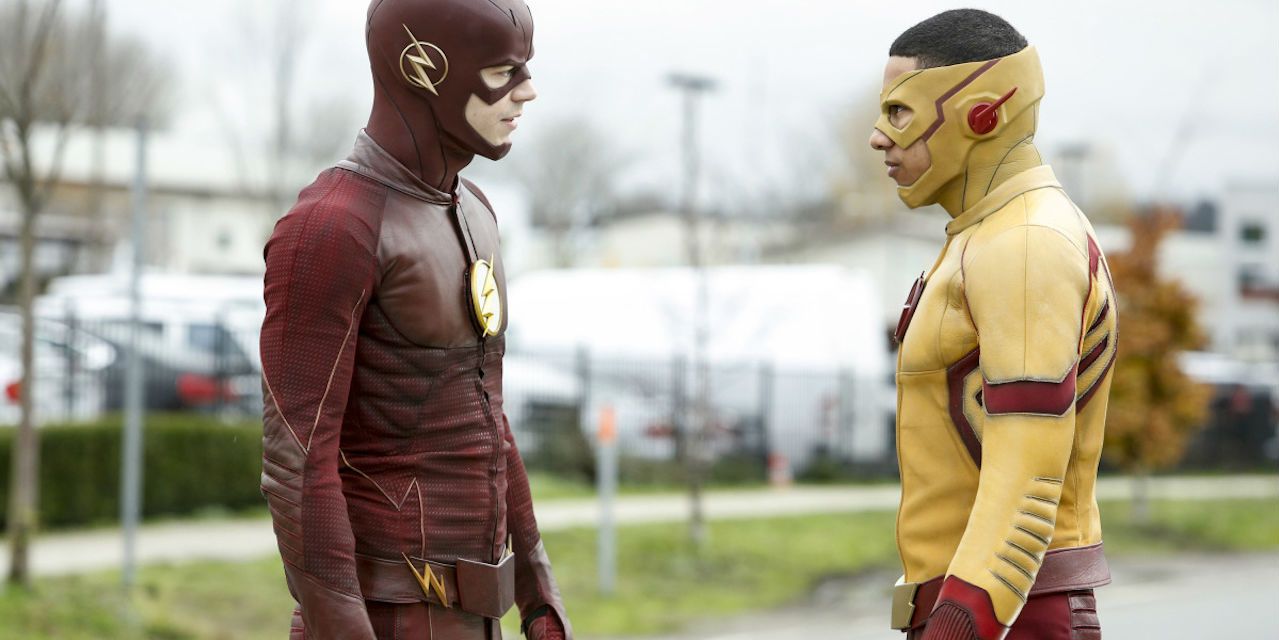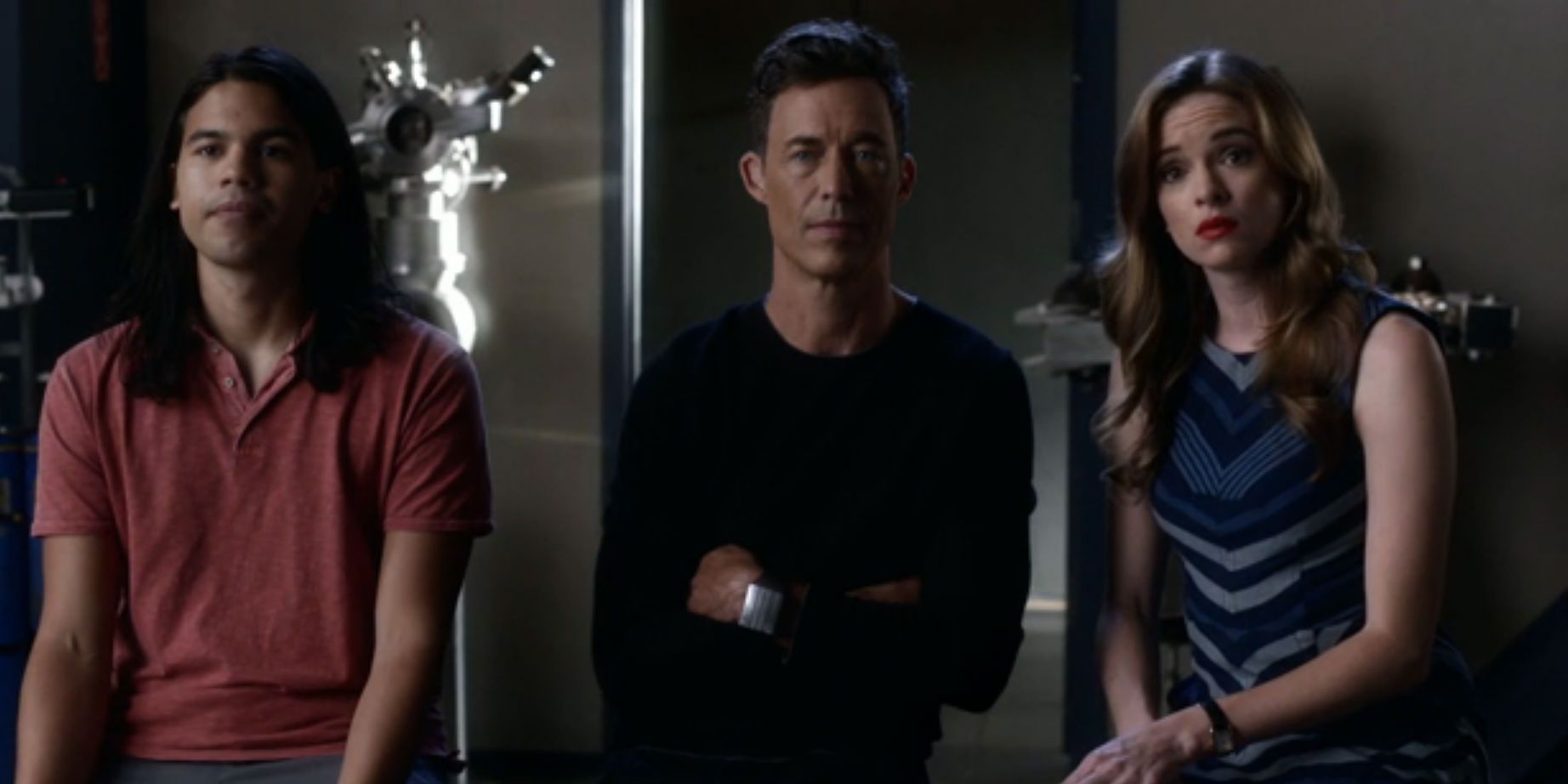The CW's Trial of The Flash left Barry Allen in a prison cell, and left fans with their most disappointing comic adaptation yet. With the midseason finale of The Flash ending on a cliffhanger, The Thinker having bested Barry Allen by framing him for murder, the stage was set. Comic fans were quick to deduce that an adaptation of "The Trial of The Flash" was coming - the DC Comics story that put the speedster on trial for the same charge - but with a Thinker twist. How would Barry Allen, forensic scientist, be able to use his expertise to foil his villain's scheme and prove his innocence? How would his friends deal with the pressure of Barry's future hanging in the balance?The good news is that the won't have to be in suspense, and neither will fans. After describing the trial as "their take" on the classic Cary Bates storyline from The Flash comics of the 1980s, the showrunners wrapped it all up in a single episode. And suddenly, the stripping down of a years-long story from the comics into a handful of scenes brought flashes of Flashpoint's adaptation to the TV show, as well.RELATED: The Flash Team Could Have Easily Proven His InnocenceThe TV show's adaptation of the Flashpoint comic event was more than a disappointment, condensing a universe-altering event in the comics into a single episode. In that case, fans felt let down after dreaming of a season (or seasons) long adventure through a parallel timeline, encountering twisted versions of Barry's friends, and some seriously painful emotional turmoil. But with the adaptation of "The Trial of The Flash" - and the episode which bears that exact name - the issue is far more concerning.
Just Like Flashpoint, This Simply Wasn't 'The Trial of The Flash'
The problem lies in the fact that this story is simply NOT "The Trial of The Flash" in any meaningful way. In any way that a fan would ever recognize, any more than The Dark Knight is an adaptation of Alan Moore's The Killing Joke. Joker is in it, sure, and Batman has to beat him. But no fan would ever conflate one story with the other, nor would one of the filmmakers encourage that expectation (by naming the movie The Killing Joke, for instance). This isn't a case of splitting hairs or letting small changes affect enjoyment for hardcore comic fans, either. For starters, the episode title only makes sense if it's interpreted as "The Trial of The Flash TV Show," as in the episode of the show concerned with a trial.
A more accurate title for the episode would obviously be "The Trial of Barry Allen." And as small a detail as that might seem to some, it's what the entire story is based on. Barry Allen, facing criminal charges as a result of his enemy's scheming, framing the hero for a murder he didn't commit. Despite lacking any unique motive, and without ever convincingly explaining how the wheelchair-bound victim ended up in Barry's apartment, he was found guilty. The trial ends as quickly as it started, missing the meaning of the comic book story by a wide margin.
But even worse is just how incredible a story the TV show's version of the story could have been.
The TV Show Misses The Trial of The Flash's Point
Before getting into the specifics of the original (actual?) "Trial of The Flash" comic story, a two-year saga condensed into half an episode, let's get the big beats. It isn't Barry Allen who faces murder charges, but The Flash, as the title of the story implies. He's not charged with murdering The Thinker, but his most iconic Reverse-Flash, Eobard Thawne. And unlike the TV show, The Flash is on trial for a murder... that he did commit. It's that detail which makes the story what it really is, shaping the conflicts, and leading to some of its best moments.
After all, it's The Flash who the citizens of Central City and the world look to for heroism and moral fortitude. To see him go too far and take a life - even the life of a supervillain - is what "The Trial of The Flash" is remembered for. And done right, the show could have delivered a version of the story that was even more powerful.
Let's Make This Clear: The Flash Did Kill Eobard Thawne
That point bears repeating: it's what actually happens in the comic story from writer Cary Bates that makes it historic, arguably more than how it's told. After having killed Iris Allen years earlier, Reverse-Flash returns to kill Barry Allen's new fiancée, Fiona Webb, on the day of their wedding. After chasing Thawne to the ends of the Earth and missing his own wedding as a result, Barry finally catches up just as Thawne prepares to take Fiona's life. Screaming that he won't let it happen again, The Flash grabs hold of Thawne's neck and stops suddenly with a snap, killing the villain instantly.
Was the act that of a desperate hero? Was it personally motivated, with Barry's emotions ruling him over reason? Are superheroes and villains subject to the exact same laws as everyday people? And as the courts ultimately decide after a lengthy trial, is The Flash guilty of murder?
The Flash's Version of 'The Trial' Could Have Been Even Better
The real disappointment-- well, perhaps the greatest disappointment is that The CW's Flash didn't just have the pieces in place to do "The Trial of The Flash" justice, but the track record to surpass it. The comics were forced to sprinkle in insane rogue antics that broke up the storyline, placing surprisingly little emphasis on the actual trial in the story's title. Yet the TV show has half a dozen other heroes to pick up the slack, should The Flash have been driven to commit murder and arrested, intentional or not. And as any fan of The Flash knows by now, the idea of Barry Allen neglecting safety is easy to swallow. Just put Iris West in danger again, having lost her more than once already, and at this point Barry would be just as frustrated as the fans. Get rough with the villain who threatens her life, Barry. Beat the bad guy to a pulp and the audience would likely cheer.
Have Barry lose perspective and subject that villain to force enough to kill them... and you've got a story four seasons in the making. Put Barry into the same tough spot as the comics when taken into custody: remove the cowl, and say goodbye to safety. Refuse to remove it, and say goodbye to the trust between Flash and half the city. Barry and Wally West have differed since the beginning of their partnership, making it completely fitting for Wally-- sorry, Kid Flash to be called to the witness stand and questioned under oath.
Put the question of whether or not Barry went too far to another superhero, and see if Wally will admit, as he did in the comics, that the villain's death wasn't necessary. Conveniently, shortly before he parts ways with Barry and Team Flash to join the Legends of Tomorrow as Kid Flash. See how that question ripples through the West family, the CCPD, Team Flash, the public... drawing lines and straining friendships over a question that actually matters, for a change.
Force Barry to accept that he has taken a life, and press upon him the burden and responsibility of being a hero that he has yet to truly face. And intentionally or not, make him the killer his father was wrongfully accused of being, and see his imprisonment in his father's old cell take on that much more meaning.
And last but not least, finally give a voice to the idea that heroes shouldn't need to kill - especially not the fastest man alive - as other Arrowverse heroes shoot, burn, detonate, or slash countless henchmen on a weekly basis. In short, ask the hard questions that the show is built to, and even the original comic never could have. Honestly, for a villain who's supposed to be as brilliant as The Thinker, manipulating The Flash into that trap seems a far more inspired scheme.
-
We can only imagine the story that might have been spun, had The Flash's writers had any interest in adapting the recognizable pieces of "The Trial of The Flash," and exploring the question at its heart. Instead, a courtroom is used. Barry Allen is framed for a murder the audience (and his team) knows he didn't commit, is found guilty in less than a half-hour of screentime, and locked up to wait until the next plot sees him released, or escaping.
Flashpoint was a surprising disappointment, but The Flash's "Trial" makes it clear: when it comes to adapting Flash comic stories and events, fans should lower their expectations significantly from the lofty heights set by the first two seasons.
MORE: The Flash Drops a HUGE Evil Superman Easter Egg
The Flash airs Tuesdays @8pm on The CW.

